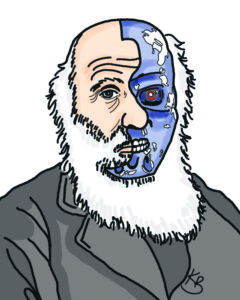Concordia’s theatre and music departments are collaborating on an ambitious original musical theatre piece based around the life of one of science’s most controversial figures, Charles Darwin. Darwin: Endless Forms Most Beautiful is a libretto, multimedia foray and science fiction parable, bringing live musicians and special effects to Loyola’s Oscar Peterson Hall this week.
You know Darwin from science textbooks as the father of the theory of evolution, a theory he developed after a long voyage around the world on The Beagle. The theory caused a lot of consternation back then, and it continues to do so today, as schools in North America vehemently ban the teaching of evolution in favour of creationism, the theory that God basically whipped up our planet within a few days and then took a day off.
Darwin: Endless Forms Most Beautiful has its feet planted firmly both in the past and in the future. A Cyborg (Cassandre Mentor) is about to undergo a major transformation, the next step in her evolution, so-to-speak. She strives to understand how it will play out by examining Darwin’s story, enacted by actors in period costume and accents.
Director Keith Turnbull places the Cyborg about 15 years from the present. To complete the look, Mentor is about a foot taller thanks to leg extensions, with her voice amplified and treated for that robotic edge, and parts of her seafoam-coloured body transform. (Summing up the show’s design aesthetic, Turbull quips it’s got “your tweed jacket and your high-tech.”)
If it’s starting to sound like a steampunk musical, you’ll be forgiven. Kyle Purves, who plays the young Darwin, admitted the show’s genre is “not easy to peg.” It’s not musical theatre, yet not quite an opera.
What it is is ambitious. The show features projections and extensive sound design, in addition to the complexities of Mentor’s costume.
Purves said the seven-member cast had to be on their toes throughout the preparation of what is essentially a “laboratory work,” with the bulk of the script coming in about two weeks before the final run-throughs. Ralph Denzer came up with the original idea, and wrote the music, while Concordia alumnus Ryan Hurl is the librettist. The show features six instrumentalists, and all the cast members are singers. The show itself has what Purves described as an “operatic aesthetic.”
As Darwin is a new work, the show has the advantage of the audience having no preconceived notions, but that in itself is also a challenge. The most difficult part, according to Purves, is the small cast having to tackle a changing script heavy in information. “There’s so few of us, but we’re trying to make a bold statement.”
But the theatre student is optimistic: “It’s a test run, but it’s going to be a really grand test run.”
Speaking on the phone after a rehearsal on Saturday, Turnbull said he finds that Darwin is now part of the “geist of the times,” meaning of the moment. “The thing with Darwin is that he’s pretty well part of the times now, because of the question of evolution. There have been like a dozen Darwin films in the past five years.”
One movie that leaps to mind is Creation, the 2009 film with real-life Hollywood couple Paul Bettany and Jennifer Connelly as Emma and Charles Darwin.
The reason for this recent surge in popularity beyond the ongoing creationism debate, Turnbull said, is that people are being categorized more and more, a technique brought to the forefront by Darwin and used on animal and plant life, and now, humans. “We’re all being studied under the microscope.” Our shopping habits are analyzed, our opinions are ranked in polls, Facebook calibrates ads based on our a/s/l. “I think people are starting to recognize the depths of what he started.”
Darwin: Endless Forms Most Beautiful will be performed at the Oscar Peterson Hall at Loyola Feb. 17-19 at 8 p.m., and 19-20 at 2 p.m. Tickets are $5 for students.






Comments are closed.